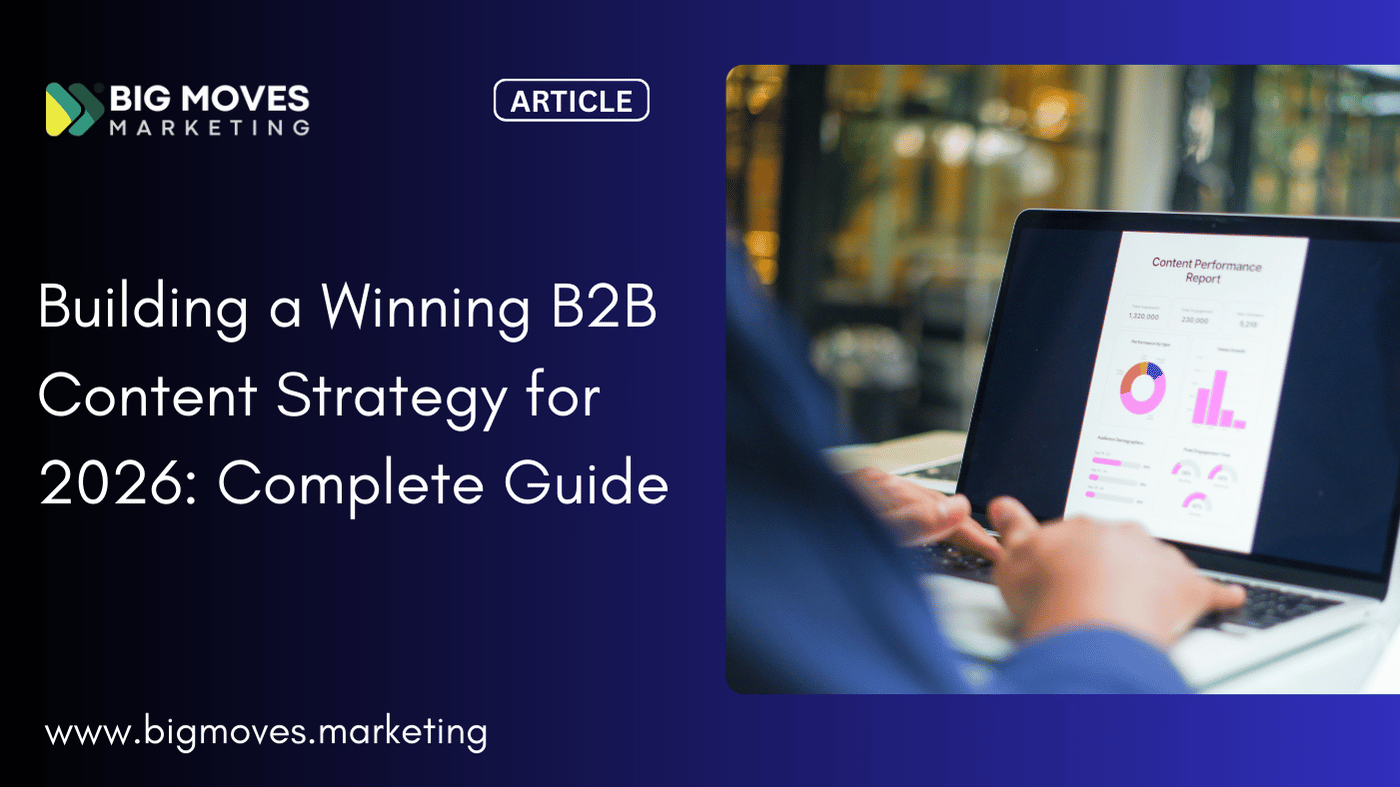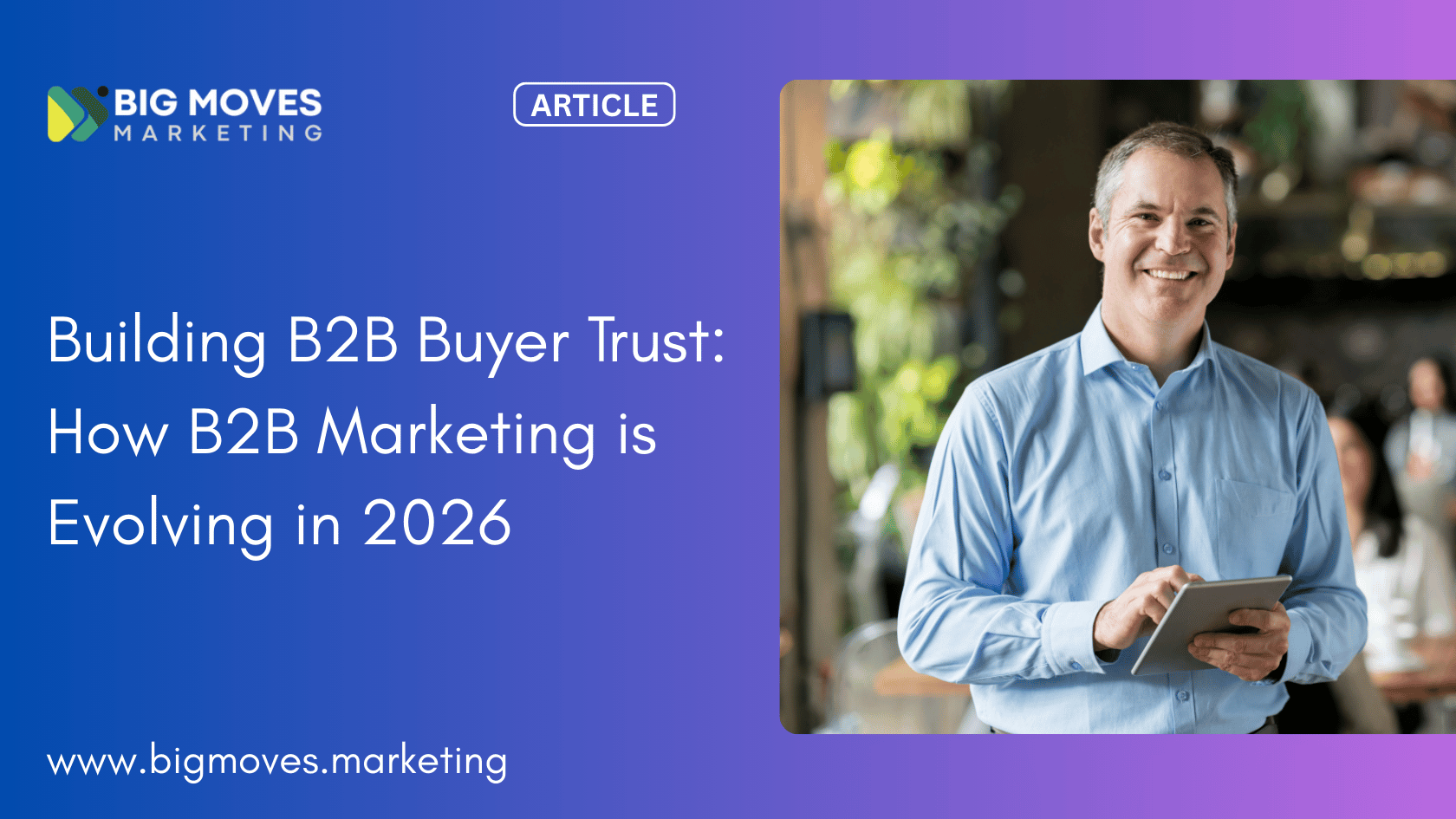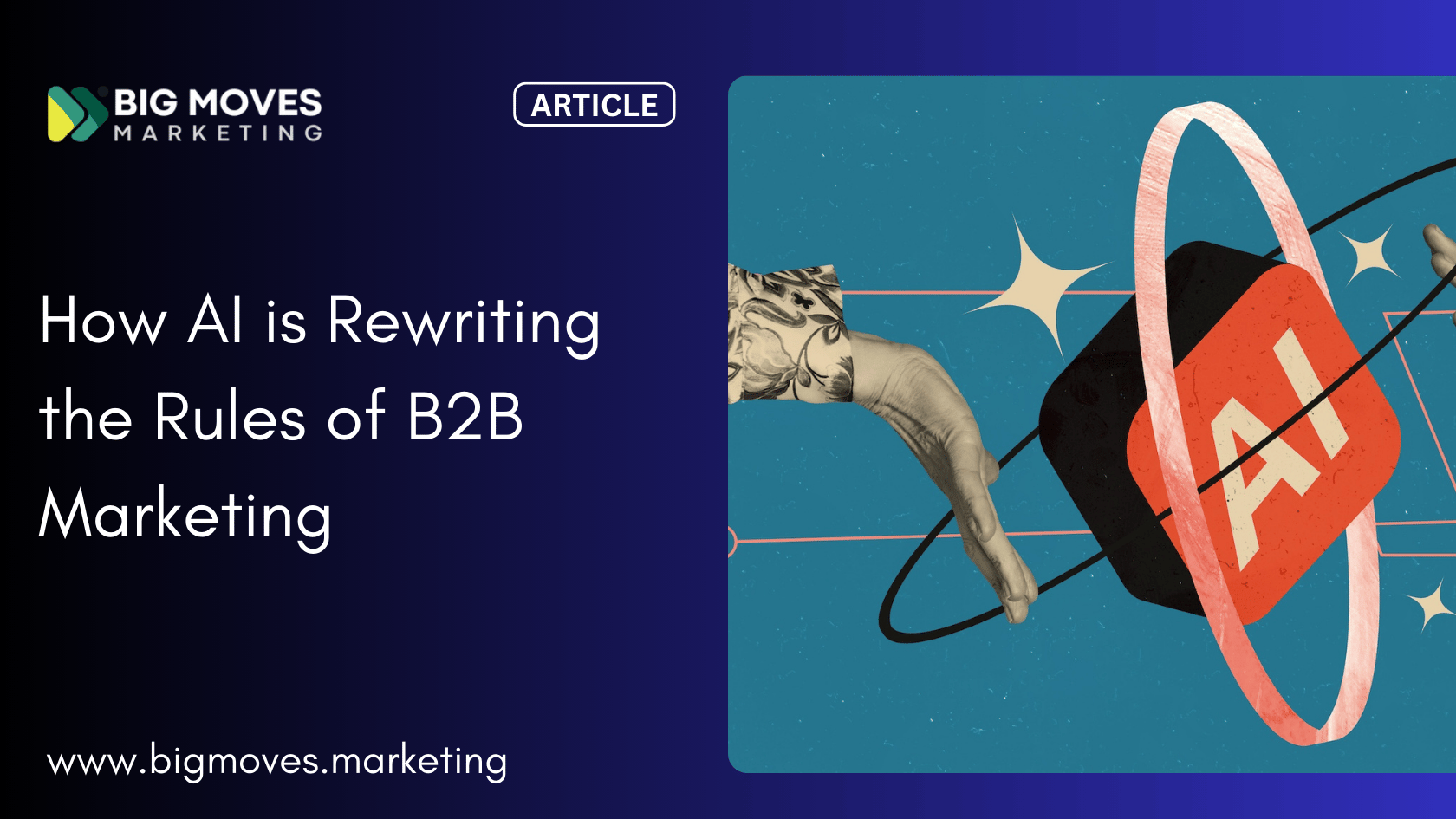AI in B2B Marketing: From Overwhelm to Competitive Advantage in 2025

AI in B2B Marketing: From Overwhelm to Competitive Advantage in 2025
The B2B marketing landscape in 2025 feels like standing at the edge of a technological avalanche. Every day brings new AI tools, platforms, and promised solutions. LinkedIn feeds overflow with "revolutionary" AI marketing takes, while industry publications trumpet the latest breakthrough that will supposedly transform everything. For marketing leaders, this constant barrage of innovation can feel overwhelming rather than empowering.
The reality is stark: 73% of B2B marketers report feeling pressure to adopt AI technologies, yet only 31% feel confident in their current AI strategy implementation. This disconnect between urgency and understanding creates a dangerous gap—one where businesses either rush into AI adoption without strategy or become paralyzed by the complexity of choice.
But here's the truth that cuts through the noise: successful AI implementation in B2B marketing isn't about having the latest tools or the most sophisticated algorithms. It's about turning the endless possibilities of artificial intelligence into practical, measurable next steps that drive real business outcomes.
The AI Overwhelm Epidemic in B2B Marketing
The marketing technology landscape has exploded from approximately 150 tools in 2011 to over 11,000 in 2024. Within this ecosystem, AI-powered marketing solutions represent the fastest-growing segment, with new platforms launching weekly. This rapid expansion creates what researchers call "choice overload"—a psychological phenomenon where too many options lead to decision paralysis.
B2B marketing teams face unique challenges in this environment. Unlike B2C marketers who can often test and iterate quickly with consumer-facing campaigns, B2B decisions carry higher stakes, longer sales cycles, and more complex stakeholder dynamics. The pressure to "get AI right" intensifies when a single campaign might influence million-dollar deals or year-long partnerships.
This overwhelm manifests in several ways:
Tool Fatigue: Marketing teams cycle through platforms without fully implementing any single solution, leading to fragmented data and inconsistent results.
Strategy Confusion: The abundance of AI capabilities makes it difficult to identify which applications align with specific business objectives.
Resource Allocation Paralysis: Teams struggle to determine where to invest time, budget, and training resources for maximum impact.
Cultural Resistance: The rapid pace of change creates anxiety among team members who fear being left behind or replaced by automation.
The Foundation: Leading with Clarity Over Complexity
The most successful B2B marketing teams approach AI implementation with what Stanford researchers call "strategic simplicity"—focusing on clear objectives rather than technological sophistication. This approach starts with three fundamental questions:
- What specific marketing challenges are we trying to solve?
- How will we measure success beyond vanity metrics?
- What capabilities do we need to build versus buy?
Leading marketing organizations establish AI governance frameworks that prioritize business outcomes over technical features. They create cross-functional teams that include not just marketers, but also sales, customer success, and IT professionals who can provide holistic perspectives on AI implementation.
These teams develop what's known as an "AI readiness assessment"—evaluating data quality, team skills, technological infrastructure, and organizational culture before selecting specific tools or platforms. This foundation-first approach reduces the risk of costly implementation failures and ensures that AI initiatives align with broader business strategy.
Keeping Content Relevant and Authentic in an AI-Driven World
One of the most significant challenges facing B2B marketers is maintaining content authenticity while leveraging AI for scale and efficiency. The fear is legitimate: poorly implemented AI content strategies can result in generic, robotic messaging that fails to resonate with sophisticated B2B audiences.
However, advanced B2B marketing teams are discovering that AI actually enhances rather than diminishes content relevance when applied strategically. The key lies in understanding AI as an amplifier of human insight rather than a replacement for human creativity.
Content Intelligence and Audience Understanding
Modern AI tools can analyze vast amounts of customer data, social media interactions, and engagement patterns to identify content themes that resonate with specific audience segments. This capability goes far beyond basic demographic targeting, enabling marketers to understand the nuanced pain points, priorities, and communication preferences of different buyer personas.
For example, AI-powered content analysis can reveal that CFOs engage most with content focused on ROI and risk mitigation during the first half of the quarter, while IT directors prioritize implementation and integration content during budget planning cycles. This granular understanding enables content teams to create highly targeted messaging that feels personal and relevant.
Dynamic Content Optimization
AI enables what researchers call "contextual content adaptation"—the ability to modify messaging based on individual user behavior, engagement history, and current market conditions. This isn't about changing every word, but rather adjusting emphasis, examples, and calls-to-action to match the recipient's current stage in the buyer journey.
Advanced B2B marketing teams use AI to optimize content distribution timing, channel selection, and format preferences for individual prospects. This level of personalization, when executed properly, increases engagement rates by an average of 127% compared to generic content distribution strategies.
Transforming Analytics from Data Dumps to Strategic Intelligence
The democratization of data analytics through AI represents perhaps the most transformative opportunity for B2B marketing teams. Traditional analytics often resulted in overwhelming dashboards filled with metrics that provided little actionable insight. AI changes this dynamic by converting raw data into strategic intelligence that drives decision-making.
Predictive Lead Scoring and Pipeline Management
AI-powered predictive analytics can identify which prospects are most likely to convert, when they're likely to make purchasing decisions, and what specific actions might accelerate their buyer journey. This capability transforms lead qualification from a reactive process to a proactive strategy.
Advanced implementations use machine learning algorithms to analyze hundreds of behavioral signals—from email engagement patterns and website browsing behavior to social media activity and content consumption preferences. These systems can predict conversion probability with accuracy rates exceeding 85%, enabling sales teams to prioritize high-value opportunities and marketing teams to optimize campaign targeting.
Attribution and ROI Optimization
Multi-touch attribution becomes exponentially more sophisticated with AI analysis. Rather than relying on simple first-touch or last-touch models, AI can trace complex customer journeys across multiple touchpoints, channels, and time periods to identify the marketing activities that actually drive revenue.
This level of attribution intelligence enables marketing teams to optimize budget allocation in real-time, shifting resources toward high-performing channels and campaigns while identifying underperforming investments that should be discontinued or restructured.
Scaling Personalization While Building Authentic Trust
The promise of personalization at scale has been a marketing holy grail for decades, but AI is finally making this vision achievable for B2B organizations. However, the challenge lies in executing personalization strategies that feel authentic rather than invasive or manipulative.
Account-Based Marketing Evolution
AI transforms traditional account-based marketing from a manual, resource-intensive process to a scalable, data-driven strategy. Modern AI platforms can analyze thousands of accounts simultaneously, identifying expansion opportunities, cross-sell potential, and risk factors that might indicate customer churn.
This capability enables marketing teams to create highly customized campaigns for hundreds or even thousands of target accounts without proportionally increasing resource requirements. The key is developing AI systems that understand industry-specific contexts, organizational structures, and decision-making processes.
Trust-Building Through Transparency
The most successful B2B marketing teams using AI prioritize transparency in their personalization efforts. Rather than trying to hide their use of artificial intelligence, they communicate openly about how AI helps them provide more relevant, timely, and valuable information to prospects and customers.
This transparency-first approach builds trust by demonstrating that AI is being used to better serve customer needs rather than to manipulate or deceive. Leading organizations create "AI ethics statements" that outline how they use artificial intelligence in marketing and sales processes, providing prospects with clear understanding of data usage and personalization methodologies.
Automation with Confidence: Building Systems That Scale
The final frontier for most B2B marketing teams is developing the confidence to automate critical marketing processes without losing human oversight and control. This requires building AI systems that are both sophisticated enough to handle complex scenarios and transparent enough to enable human intervention when necessary.
Intelligent Campaign Management
Advanced marketing automation goes beyond simple email sequences to encompass dynamic, multi-channel campaigns that adapt based on individual prospect behavior and broader market conditions. These systems can automatically adjust messaging, timing, and channel selection while maintaining brand consistency and strategic alignment.
The key to successful automation is building what technologists call "human-in-the-loop" systems—AI platforms that make intelligent recommendations and execute routine tasks while flagging unusual situations or high-stakes decisions for human review.
Quality Assurance and Performance Monitoring
Automated systems require sophisticated monitoring capabilities to ensure they continue delivering optimal results over time. AI-powered quality assurance tools can identify when automated campaigns are underperforming, when prospect responses indicate messaging problems, or when market conditions require strategy adjustments.
These monitoring systems enable marketing teams to maintain confidence in their automation strategies while ensuring that AI systems continue learning and improving from real-world results.
The Strategic Implementation Framework
Successfully navigating AI implementation requires a structured approach that balances ambition with pragmatism. Leading B2B marketing organizations follow a four-phase framework:
Phase 1: Foundation Building involves assessing current capabilities, establishing data quality standards, and creating organizational alignment around AI objectives.
Phase 2: Pilot Implementation focuses on testing AI solutions in low-risk scenarios to build team confidence and identify optimization opportunities.
Phase 3: Scaled Deployment expands successful pilot programs across broader marketing functions while maintaining quality and performance standards.
Phase 4: Continuous Optimization establishes ongoing learning and improvement processes that ensure AI systems continue delivering increasing value over time.
Conclusion: From Possibility to Competitive Advantage
The B2B marketing landscape will continue evolving at an accelerating pace, with AI playing an increasingly central role in customer acquisition, retention, and growth strategies. The organizations that will thrive are those that approach AI implementation with strategic clarity, focusing on practical outcomes rather than technological novelty.
Success requires moving beyond the overwhelm of endless possibilities to develop systematic approaches that turn AI potential into measurable business results. This means prioritizing authenticity over automation, intelligence over complexity, and strategic thinking over tactical tool adoption.
The competitive advantage in 2025 and beyond won't belong to the organizations with the most sophisticated AI tools, but to those that most effectively integrate artificial intelligence with human expertise to create superior customer experiences and drive sustainable business growth.
The path forward is clear: embrace AI as a strategic enabler rather than a technological distraction, focus on building capabilities that compound over time, and maintain the human insight and creativity that make B2B marketing truly effective.
The future of B2B marketing is here, and it's powered by the intelligent integration of artificial intelligence with human expertise. The question isn't whether to adopt AI—it's how quickly you can transform possibility into competitive advantage.
Original report can be downloaded on G2: https://learn.g2.com/the-ai-marketing-mind
%20-%20Alternate.svg)






%20-%20white.svg)